Democratic Primary Exit Poll Analysis
Mississippi and Michigan held their primaries Tuesday.
— -- Democrats voted in the Mississippi and Michigan primaries. Who turned out in Tuesday's primaries and what motivated their votes?
Emerging Themes
Here's a summary of what we saw in the Democratic contests across states, grouped by key themes.
Mainline Democrats account for more than eight in 10 Democratic primary voters in Mississippi and seven in 10 in Michigan, with turnout among Democrats in Michigan down (and turnout among independents up) from 2008. In Mississippi, turnout among mainline Democrats is up from 2008.
Clinton v. Sanders
Many more voters in Mississippi say Clinton’s views on the issues are about right than say so about Sanders (three-quarters vs. fewer than half). Fewer than one in 10 say Clinton’s too liberal, while nearly three in 10 think Sanders is too liberal. That’s similar to what we’ve seen in previous contests overall. But, in Michigan, slightly more than six in 10 think both candidates’ policies are about right.
In Mississippi, nearly twice as many voters think Clinton’s policy proposals are realistic as say the same about Sanders’. In Michigan, it’s much closer, seven in 10 for Clinton, six in 10 for Sanders.
Race
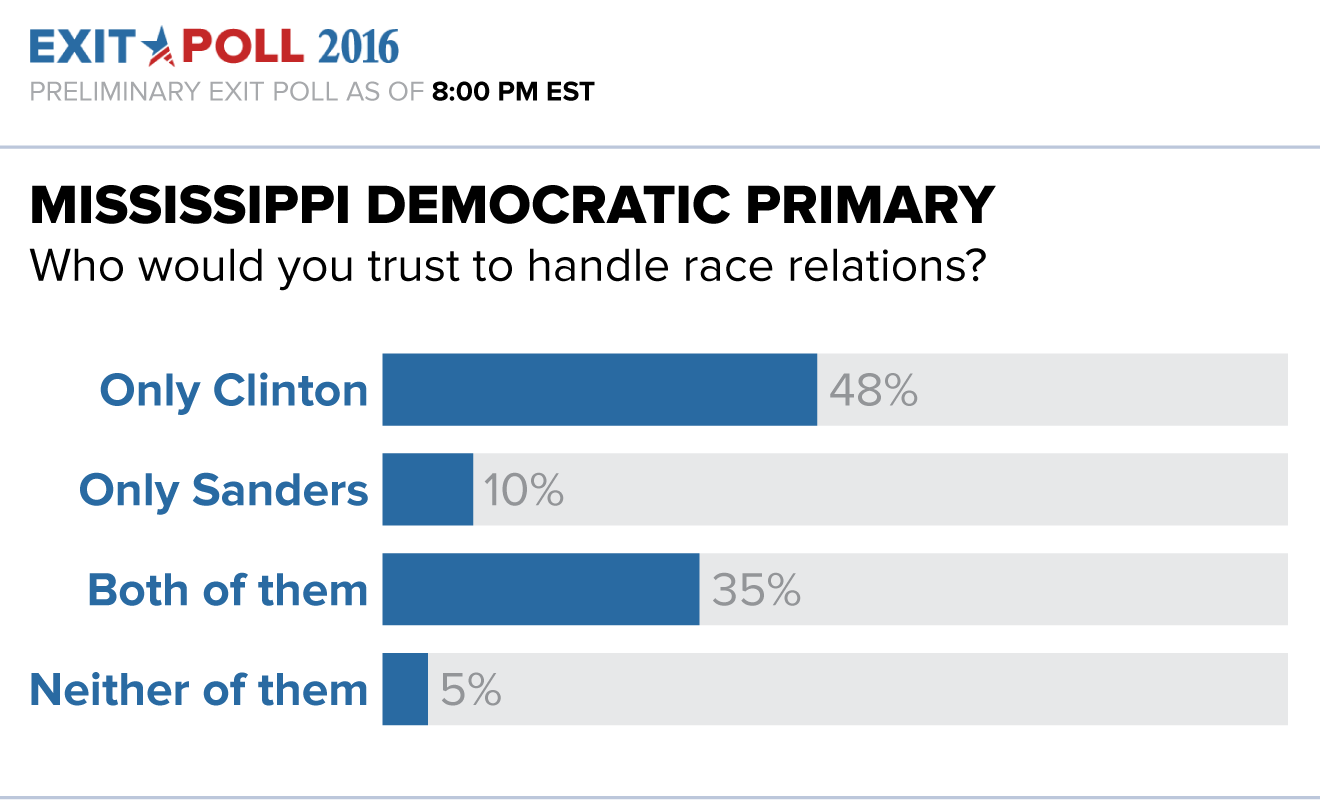
Similarly, nearly twice as many voters in Mississippi trust Clinton than Sanders to handle race relations, while they’re nearly even on this in Michigan. Majorities in both states say race relations have gotten worse in the last few years.
Sanders was helped, as well, by the relative dominance of white voters – whites accounted for seven in 10 Democratic primary voters in Michigan, compared with fewer than three in 10 in Mississippi. And independents accounted for a quarter of the electorate in the Michigan contest, a better group than mainline Democrats for Sanders.
Clinton, moreover, did less well with black voters in Michigan than in other states, winning fewer than two-thirds of them, compared with 80 or even 90 percent elsewhere.
Honest and Trustworthy
Clinton continues to have some problems with perceptions of her honesty. In Michigan, only about six in 10 today say she’s honest and trustworthy, vs. eight in 10 who say so about Sanders. In Mississippi, she does much better, where three-quarters say she’s honest, as do seven in 10 of Sanders.
Experience
Nearly nine in 10 voters in Mississippi and eight in 10 in Michigan want the next president to be someone with experience in politics. Clinton’s won this group by more than 2-1 in this year’s previous primaries.
Gender Gap
Majorities of voters in both states are women (reaching six in 10 in Mississippi). Women have outnumbered men across in the 2016 Democratic primaries, and have voted by 2-1 for Clinton in contests.
Voter Turnout
Turnout among liberals is up from 2008 in Mississippi and Michigan – and could end up as highs in both states.
Mississippi
Clinton won across the board in Mississippi – with record or near-record support from whites as well as overwhelming backing from the state’s majority black electorate, according to exit poll results.
Black turnout as a share of the total was up this year, to six in 10 voters from half in the 2008 Democratic primary. Clinton fared characteristically well in this group, with nearly nine in ten of their votes. Notably, though, Clinton also won whites in Mississippi by nearly a 2-1 margin. If the data hold in later results, that’ll be her best showing among whites in any state to date.
Clinton again dominated among women, winning them by a 4-1 margin, matching her high this cycle. But while she’s been weaker among men in other states, she won three-quarters of them here.
In addition to blacks, turnout among mainline Democrats as a percentage of all primary voters was up this year, to more than eight in 10. They’ve strongly favored Clinton in previous contests this season, and continued to do so here. And, tellingly, seven in 10 Democratic voters said they want the next president generally to continue Barack Obama’s policies – nearly 20 points more than the average this year. Eight in 10 of them voted for Clinton.
Blacks account for six in 10 Mississippi Democratic primary voters in exit poll results, which if it holds, will be a record in the state, and similar to their turnout in South Carolina this year, where Hillary Clinton won by a wide margin on the strength of her performance among blacks. To date, Clinton’s won a remarkable 85 percent of black voters. In Michigan, turnout among blacks today is lower, two in 10 voters.
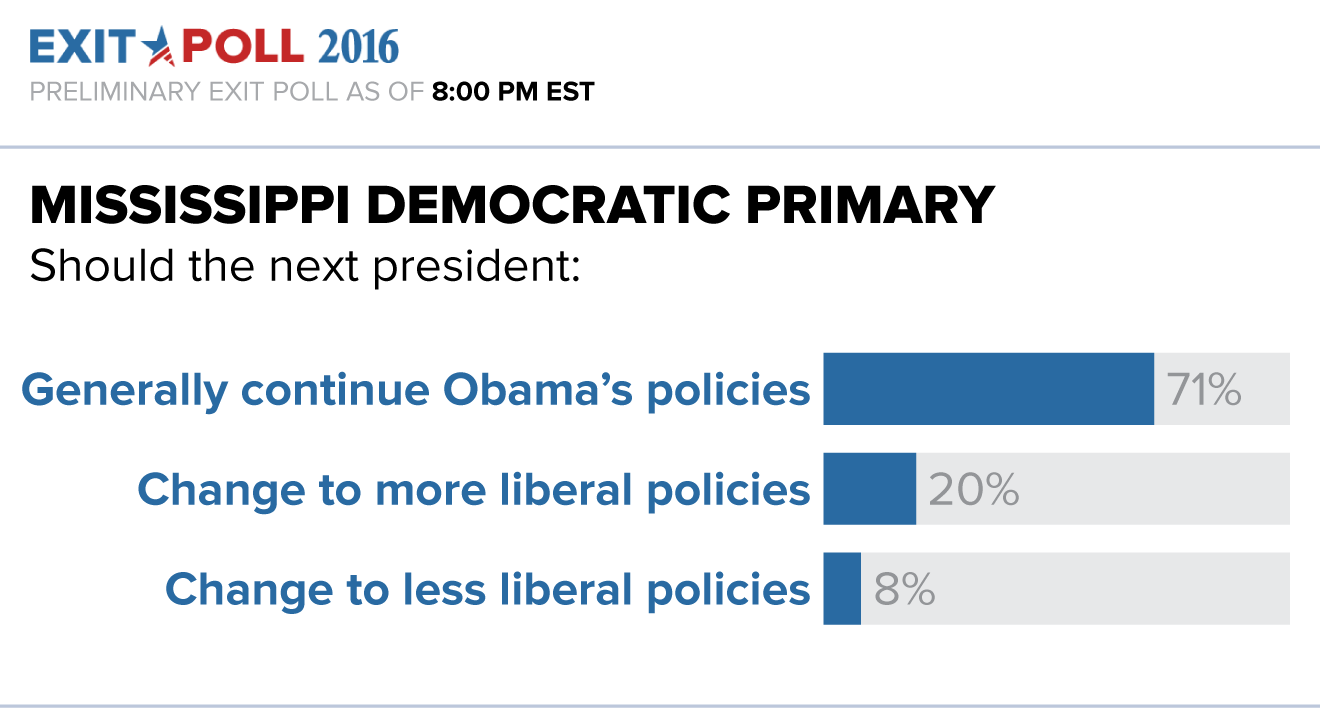
Seven in 10 Democratic voters in Mississippi want the next president to continue Barack Obama’s policies, vs. only slightly more than half in Michigan; Clinton has won nearly eight in 10 of these voters so far in 2016. About two in 10 in Mississippi want more liberal policies, vs. three in 10 in Michigan, a group that’s voted strongly for Bernie Sanders previously.
Clinton won across the board in Mississippi – winning whites as well as overwhelming backing from the state’s majority black electorate, according to exit poll results.
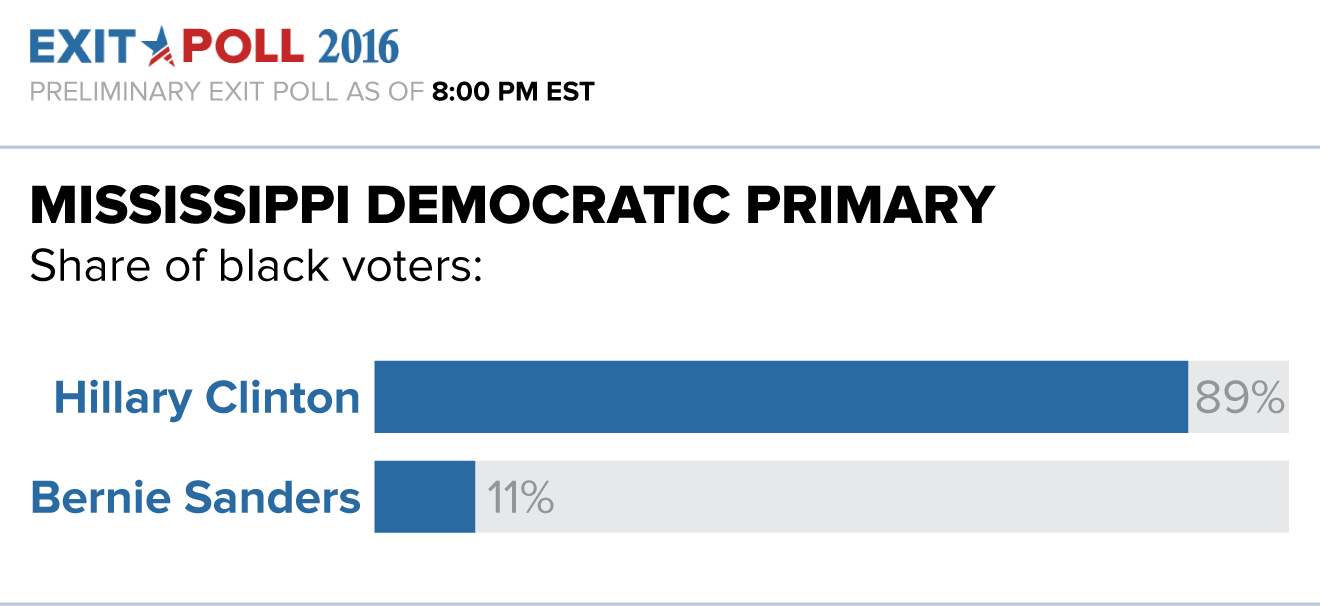
Black turnout as a share of the total was up this year, to seven in 10 voters from half in the 2008 Democratic primary. Clinton fared characteristically well in this group, with nearly nine in ten of their votes. Clinton also won whites in Mississippi, by a much narrower margin, less than 10 percentage points – better than usual for her this year but off her best, 23 points in Arkansas.
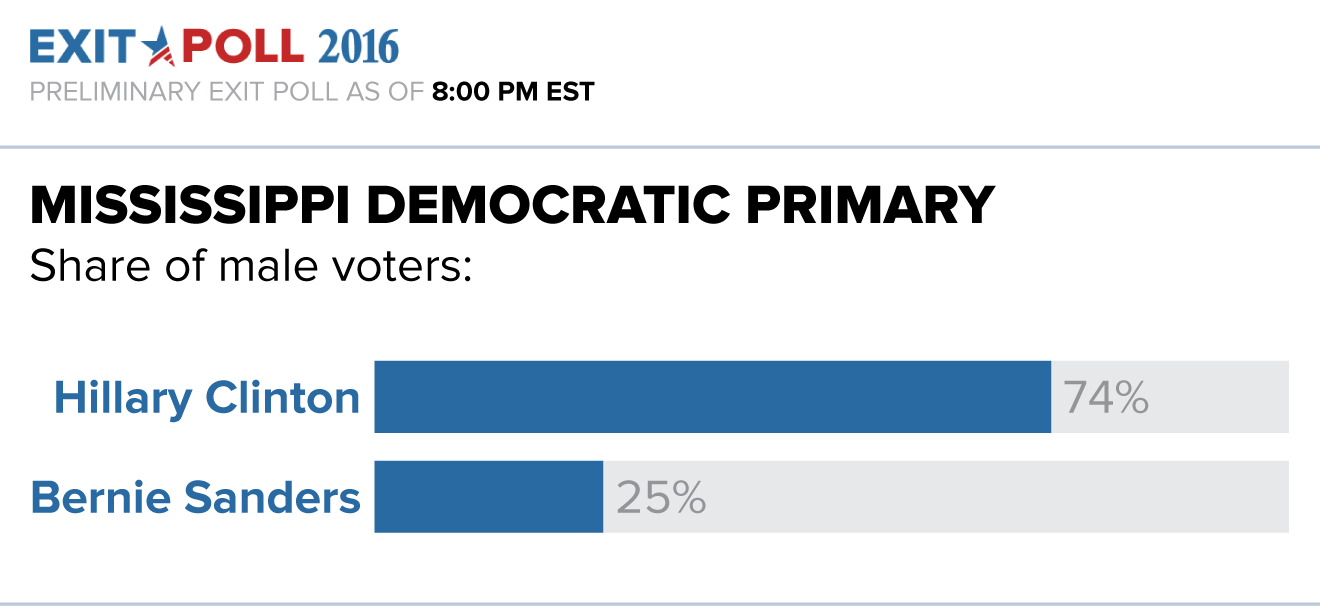
Clinton again dominated among women, winning them by a 4-1 margin, matching her high this cycle. But while she’s been weaker among men in other states, she won three-quarters of them here.
In addition to blacks, turnout among mainline Democrats as a percentage of all primary voters was up this year, to more than eight in 10. They’ve strongly favored Clinton in previous contests this season, and continued to do so here. And, tellingly, seven in 10 Democratic voters said they want the next president generally to continue Barack Obama’s policies – nearly 20 points more than the average this year. More than eight in 10 of them voted for Clinton.
Clinton ran evenly with Sanders among voters in Mississippi under age 30 – a group he’s won by more than 30 percentage points across all primaries to date. Her support grew from there – to two-thirds of voters in their 30s to more than eight in 10 of those age 40 and older.
Michigan
Michigan looks distinctly different from Mississippi in exit poll results, with a broader focus on empathy and honesty, less on experience and electability – aiding Bernie Sanders in his quest for a Midwest comeback.
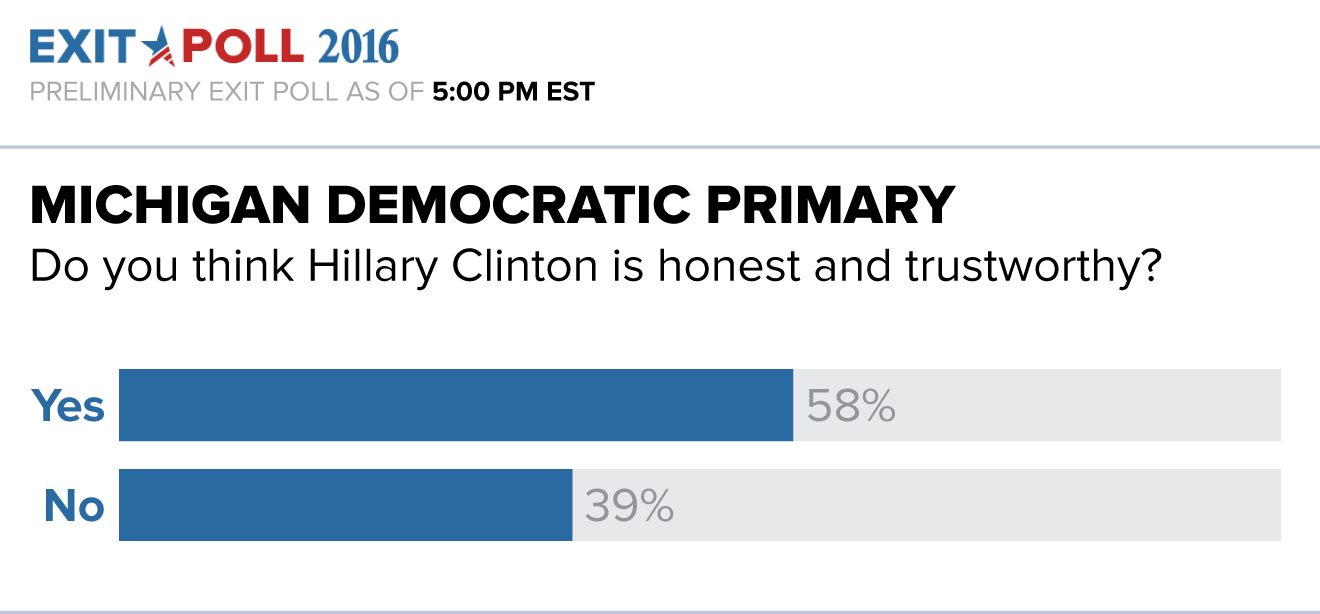
Roughly four in 10 voters in Michigan say electability or experience are most important to their vote, a group among which Clinton’s dominated in the past. But six in 10 say honesty or empathy are most important, voters who’ve been more likely to support Sanders (especially “honesty” voters) to date. In Mississippi, honesty/empathy was closer in importance to electability/experience.
Seven in 10 Democratic primary voters in Michigan would be satisfied with Sanders as the nominee, as would two-thirds with Clinton. (This question was not asked in Mississippi.)
Clinton prevailed by wide margins, as usual, among voters focused on experience (winning eight in 10 in this group) and electability. A third put a priority on a candidate who “cares about people like me” and nearly three in 10 focused on honesty and trustworthiness. Sanders led in the former group – and by a wide margin, 4-1, in the latter.
Eight in 10 voters in the Democratic contest in Michigan were more interested in an experienced candidate than in an outsider. But while Clinton has won nearly seven in 10 of that group across previous contests, her share in Michigan was smaller, just more than half.